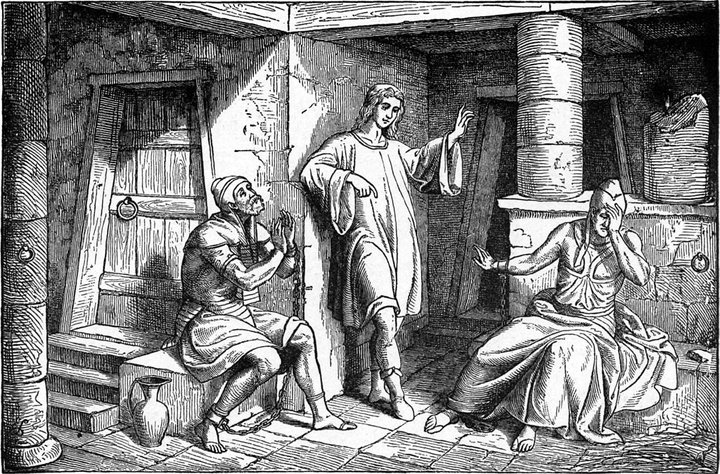 Experience, as they say, is the best teacher.
Experience, as they say, is the best teacher.
There’s nothing quite like being slapped in the face to learn a lesson the hard way. And there’s not a textbook on earth that can do that.
Life just has to happen for you to truly understand its pains, victories, and complexities. That’s why experience will always be king.
But the great thing about experience-the-teacher is, no one ever said it had to be yours.
The shortcut to learning is to dissect the experience of others. Because doing that will not only give purpose to their life struggles, but you’ll also have the pleasure of staying out of harm’s way.
So that’s what I’ll do here.
I recently searched the Bible to rediscover five men who found themselves in unique situations, yet who still had experiences we can relate to. And I’ve gathered a mix of character traits they displayed and a few lessons you can apply from their lives.
But before I go on, I want to mention that this list doesn’t include Jesus Christ. I thought about it, but it wouldn’t be right to include the perfect Person next to a bunch of imperfect people. And I want to stress the fact that everyone on this list is just like you and me.
So with all that said, let’s get right into it—cause this is gonna be a long one.
#1: Joseph
 I’ll start the list with my personal favorite, Joseph.
I’ll start the list with my personal favorite, Joseph.
Born as the eleventh son of his father Jacob, Joseph had a unique position among all his brothers. He was the first son of his father’s most beloved wife—polygamy was still accepted at the time—and he was his father’s favorite son (Genesis 37:3).
Combine those facts with the prophetic dreams Joseph had and his eagerness to explain them to his older brothers, and you get the perfect conditions for him to be hated by everyone around (Genesis 37:4-10).
Because of this, Joseph’s brothers devised a plan to kill him, but they eventually settled on selling him into slavery (Genesis 37:26-28).
Pretty cruel, right?
But fast forward a few years, and you see that the brothers’ scheme for Joseph actually put him on the path to fulfill the dreams he had earlier.
By no means did Joseph gain authority overnight. But through a series of wise actions, unfortunate setbacks, and seemingly coincidental events, Joseph eventually became second in command in Egypt—the land where he was sold into slavery years before.
And towards the end of the story, Joseph used his newfound power to provide and shelter all his people, including the brothers who once despised him (Genesis 50:20-21).
Joseph’s story is a testament to how God can use even the most evil actions to bring about the complex good.
But now with the cliffs notes version explained, here are three lessons we can gather from Joseph’s life:
Patience
In our modern world, it might as well be a criminal offense to make someone wait:
- If you’re hungry you go to the drive-thru.
- If you don’t know an answer you Google it on the spot.
- And if you don’t text back within five minutes, it’s pretty much a slap in the face.
So imagine getting confirmation that you will one day have a position of power over the people who despise you, but being forced to wait years for it to actually happen.
Yeah, it would be miserable.
Sure, you’d feel motivated for a few months or even a year down the line. But once all that time passed, most people would dismiss it as crazy talk.
Yet Joseph didn’t. He waited for his time to come and stayed true to God in the meantime. And this leads me to the next point…
Faithfulness
It’s clear that no matter the circumstance Joseph was in, he knew that God was the One he had to stay faithful to.
After Joseph was sold to Egypt for example, he served under a high ranking official named Potiphar. And over the course of time, Joseph found favor in his eyes (Genesis 39:1-5).
Joseph eventually rose to have a prominent role in Potiphar’s house. And for the first time since he was sold into slavery, it appeared that Joseph was finally on track to fulfill his dreams…
…but Potiphar had a wife.
The Bible describes Joseph as being handsome in appearance, and Potiphar’s wife definitely agreed (Genesis 39:6-7).
She tried to seduce Joseph multiple times, but he refused her advances and said the act would not only be a wrong against her husband, but against God Himself (Genesis 39:8-9).
So after an unsuccessful attempt to seduce Joseph again, the wife claimed that he attempted to rape her (Genesis 39:11-14). And this led to Joseph’s hard-earned status and innocent reputation being destroyed as he was wrongly imprisoned.
*Insert comment criticizing current social climate here.*
But what’s interesting is that the Bible never records Joseph blaming God or turning away from Him during this time—a time when his only apparent avenue to fulfill his dreams was taken away.
Joseph wanted to please God no matter what. And this faithfulness allowed him to eventually leave that prison and gain a new position of power.
Forgiveness
How could I talk about Joseph and not mention the trait of forgiveness?
In Genesis 43 we see Joseph’s brothers—yes, the same ones who sold him into slavery—come to their unrecognizable sibling to buy grain in the midst of a famine.
Joseph had every right to hold a grudge against his brothers, and with his new position in Egypt, there’s no telling what kind of punishment he could have enforced.
But after a series of tests and observations that proved his brothers’ remorse, Joseph revealed his identity to them, and he later provided for his father’s household (Genesis 45:3-5).
Without Joseph’s willingness to forgive his brothers, he couldn’t have been sent ahead “to preserve life” (Genesis 45:5). And his example shows us that even when others commit evil against us, God can always use it for good (Genesis 50:20).
#2: David
 One thing I’ve always loved about the Bible is that it portrays people—and yes, even it’s faithful heroes—as normal, sinful people.
One thing I’ve always loved about the Bible is that it portrays people—and yes, even it’s faithful heroes—as normal, sinful people.
Most of the Bible characters God used to do extraordinary feats also committed some terrible deeds:
- Jacob was a deceiver (Genesis 27:35-36).
- Moses was a murderer (Exodus 2:11-14).
- Samson’s lust got the better of him (Judges 16:15-17, Judges 16:20).
- Solomon turned to false gods (1 Kings 11:4).
- And Peter denied Christ three times (Luke 22:56-62).
But this fact is arguably more evident in the story of David than any other Bible character.
David’s life included everything from…
- Killing a lion and a bear as a young man (1 Samuel 17:34-35)
- Slaying a giant who taunted his people and his God (1 Samuel 17:48-50)
- Running from a jealous king who wanted to kill him (1 Samuel 19:9-11)
- Feigning insanity to escape from death (1 Samuel 21:11-14)
- Committing adultery and essentially killing the woman’s husband (2 Samuel 11:2-5, 2 Samuel 11:14-15)
- Making a decision that cost 70,000 men their lives (1 Chronicles 21:14-17)
- And running from his own son who rebelled against him (2 Samuel 15:13-14)
Yet despite having a history tainted by pain, disobedience, and violence, the Bible describes David multiple times as a man after God’s own heart (1 Samuel 13:14, Acts 13:22).
So what qualities get a man like that such favor in the eyes of a good God?
Well, these are just a few:
Repentance
The word “repent” or “repentance” is found all throughout the Bible. It plays an important role in becoming a believer, and also later in Christian maturity.
But the problem is, no one knows what it means anymore.
It’s another word we’ve confined to the barriers of the Christianese language. So if you’re not part of the Church community, it won’t mean much to you.
But the word repentance refers to a very simple concept:
A change of mind.
It’s a process where you critique your current thoughts, behavior, and lifestyle while also creating the opportunity to replace them with new ones.
When the Bible calls for us to repent, it encourages us to review our current mindset and begin the path to a life pleasing to God.
David was all too familiar with repentance due to the perils caused by his actions. And one of the reasons the Bible describes David as a man after God’s own heart is that he always recognized wrong actions for the evil they were, then went back to the way he knew to be right (2 Samuel 12:12-13, 1 Chronicles 21:8, Psalm 51).
Sure, David still suffered horrendous consequences due to his actions, but he never allowed himself to permanently stray from good.
(The Right Kind of) Boldness
David’s most striking character traits were his seemingly irrational faith and resulting boldness in God.
But please note the “in God” part of that sentence. David’s faith was never in himself or another human who could disappoint. It was in God and what He was capable of.
David’s victory over Goliath wasn’t about his self-belief or brash confidence. In fact, it wasn’t really about David at all (1 Samuel 17:45-47). All David did was surrender himself to the real Hero of that battle.
David was bold because he allowed himself to be used by Someone who will never be defeated. And when your confidence is placed in a Person that great, it’s hard not to come off a little cocky.
Respect for Authority
Although David usually comes to mind when you mention the kings of Israel, he was actually the second person with that title.
The first was King Saul, a once strong and promising leader who angered God with his disobedience. His refusal to obey God’s commands led to David’s anointment as future king. And as the years went on, Saul’s jealousy grew just as fast as David’s list of accomplishments.
Soon their relationship deteriorated to the point where Saul tried to kill David, causing the latter to flee for his life (1 Samuel 19:11-12).
But after retreating to a cave in one particular instance, David and his men noticed that Saul—the man who tried to kill him multiple times—had made his way to the same cave unaware of David’s presence (1 Samuel 24:3).
David was close enough to the current king to cut the cloth from his garment (1 Samuel 24:4-5). And when Saul’s party began to leave, David surprised them by revealing himself and showing them all the piece of cloth he cut before (1 Samuel 24:8-11).
David could have easily killed Saul and taken the throne if he wanted, but he respected Saul’s position too much to do so (1 Samuel 24:5-6).
Even though Saul had become an angry, bitter, and jealous king by this point, David honored him by waiting on God’s timing instead of his own.
Now did David’s actions prescribe submission to all evil leaders and their demands?
Of course not.
But similarly to the Bible’s command to respect the governing authorities (Romans 13:1), David’s actions show us that trust in God’s timing always leads to the best results.
#3: Solomon
King Solomon is one of the most interesting men in history, and his writings contributed to some of my favorite books of the Bible.
He’s the son of King David who I just covered. And his kingdom saw a time of historic prosperity even though he was the son of Bathsheba—the woman David committed adultery with before.

Solomon is mostly known for his great wisdom, a gift given to him by God after He appeared to Solomon in a dream and gave whatever he desired (1 Kings 3:5-13).
The Bible records many of Solomon’s feats of wisdom (1 Kings 3:16-28, 1 Kings 10:1-10), but if you really want a taste for it all, the book of Proverbs contains many wise sayings written by the man himself.
The beginning of Solomon’s life and rule were so great that it’s depressing to see how it all degraded in the end. But we can use the Bible’s refusal to sugarcoat his story as a means to learn the following lessons from his life:
Mentors Are Needed
As far as I’m aware, there are only 3 certainties in life:
- Death
- Taxes
- Complaints about clueless millennials
It’s reached the point where all the grumblings frustrate more than the perceived shortcomings. And to be fair to the generation I call my own, the people who complain the most are the ones least willing to teach.
This is the problem King Solomon tried to solve. He knew that without strong teaching and guidance, a nation would stumble as its youth grew old. That’s the main reason the book of Proverbs exists (Proverbs 1:3-5).
Proverbs includes Solomon’s call to the youth to gain wisdom and understanding, and the book also provides guidelines for living well in our world.
He covers everything from investments, laziness, dealing with the opposite sex, the importance of strong relationships, and most importantly, the “fear of the Lord” (Proverbs 1:7).
This reverence and healthy respect for God is the foundation Solomon builds upon. And the book of Proverbs makes it clear that the wisdom provided is priceless because it comes from the right source (Proverbs 8:10-11).
But in order to spread such wonderful info, Solomon knew he had to teach it:
Train up a child in the way he should go, And when he is old he will not depart from it. (Proverbs 22:6)
If the next generation is gonna get it right, someone has to lead the way.
Do it Now, Do it Later
Discipline and diligence.
Those two traits are crucial to success in any endeavor. That’s why Solomon’s writings stress them over and over again (Proverbs 6:6-8, Proverbs 14:23, Proverbs 12:27).
You’d think a message like that would fall in “do as I say, not as I do” territory coming from a king born into royalty. But Solomon was no stranger to work.
Before his father David died, he had an idea for what would eventually become Solomon’s greatest project, the temple in Jerusalem.
David initially wanted to build the temple himself, but was denied by God because David lived a life of war and violence—traits unbefitting of one who would build such a holy place (1 Chronicles 22: 7-8).
So he passed the job along to Solomon (1 Chronicles 22: 9-10). And Solomon didn’t disappoint.
He oversaw the construction of the temple and used an uncanny attention to detail to follow the instructions given (1 Chronicles 28:10-21). He even used the extravagance of his kingdom to add stylish touches to the new place of worship.
And for the record, the temple’s construction spanned seven years (1 Kings 6:38).
Solomon’s work on the temple was a huge success. But without his discipline and diligence, it wouldn’t have happened.
Solomon’s work serves as an example for all of us in our own projects. And his actions motivate us to give our all to whatever we do—even if we’re not the inspiration behind it.
Finish the Race
The most heartbreaking thing about Solomon’s life, especially for a fan of his like myself, is that he turned away from God in his old age and lived a life that would have disgusted his younger self.
It’s true that most of Solomon’s reign was glorious, and he and his kingdom were blessed by God in a way that’s hard for the modern world to imagine (1 Kings 10:14-27). But the resulting fame and fortune affected Solomon for the worse. And he began to disobey parts of the laws given to his people by God.
Years later as an old man, he was led astray by his many foreign wives—an arrangement clearly condemned by Israel’s law—and he turned to false religious practices (1 Kings 11:1-3).
This angered God mightily (1 Kings 11:9-10). So He sent judgments that led to the destruction of Israel’s kingdom and the enslavement of most of its people—just like He said He would (1 Kings 9:6-9).
It’s hard seeing a great man’s life end in such disappointing fashion. And even though God didn’t allow these judgments to occur during Solomon’s life for David’s sake (1 Kings 11:11-13), you can’t help but wonder how the fallen king responded.
Solomon had a life that began with such wisdom, money, and fame. Yet its end still presents the question, “what if?”.
Hopefully we can all avoid Solomon’s negative example though. Because I’d much rather echo the words of the Apostle Paul—more on him later—in his letter to the younger Timothy:
I have fought the good fight, I have finished the race, I have kept the faith. (2 Timothy 4:7)
#4: Jonah
 Now we arrive at perhaps the biggest surprise of this list.
Now we arrive at perhaps the biggest surprise of this list.
Jonah was a prophet whose story is contained in only four Old Testament chapters. But the book is one of the Bible’s most fascinating reads.
In short, Jonah was told to preach to a foreign city, but he disobeyed (Jonah 1:1-3). And this disobedience led Jonah into a series of unfortunate events.
He was thrown overboard by a frightened crew (Jonah 1:14-15), swallowed alive by a fish in the ocean (Jonah 1:17), then miraculously spit out three days later (Jonah 2:10).
Jonah then preached to the people of the foreign city. And instead of experiencing the judgment God originally planned for them, they listened to Jonah, and God showed them mercy because of it (Jonah 3:10).
But even though Jonah’s mission ended in success, the book ends with God dealing with the bitterness still in Jonah’s heart—a fact that always reminds me of a certain song from my childhood:
Because of all this, Jonah gets a bad rap in most of the Church community. And it doesn’t help that we relegate his story to a kids’ Sunday school lesson devoid of context.
But the book of Jonah, and the life of the prophet in general, contain relevant lessons for all of us—even though he isn’t the most positive example:
Love Your Enemies
This is the most difficult command the Bible teaches, and it takes center stage in the book of Jonah.
Earlier I said that Jonah’s story is usually taught without the proper context, and the result is a story about a coward who was swallowed by a fish.
But when you understand the context of Jonah’s mission and what it truly meant, you see that Jonah’s life isn’t just a side story hidden among the minor prophets. It’s a reminder about who God is and the lengths He goes to save the lost.
Nineveh was the city Jonah was called to preach to. And Nineveh was a major city of the Assyrian people.
The Assyrians had been enemies of Jonah’s people, the Israelites, for quite some time. They were some of the most ruthless and wicked people around.
Jonah wasn’t so much afraid of these brutal people as he was hopeful that God would actually destroy them. And this was Jonah’s primary conflict—he even said it himself (Jonah 4:1-3).
But later we see God’s response to Jonah’s bitterness towards his enemies (Jonah 4:11), and this response also explains why believers should forgive those who truly turn from evil ways.
Show Understanding
This point relates to the command to love your enemies. That’s because patience and understanding stem from the “why?” behind that command.
The truth is that most people don’t do wrong for the sake of it, but rather because they were never taught how to behave in the right moral and spiritual way (see Mentors Needed under Solomon). And this fact doesn’t even consider the life circumstances that influence us all.
The reason we as believers are told not to judge is because we don’t have the amount of data needed to make that judgment.
Only God can read the hearts and minds of people around the world (Jeremiah 17:10). And the people we think are out of reach might be the ones most receptive to our message.
God knew the Ninevites would turn from their ways if they heard Jonah’s message. He also knew they acted the way they did because they were never taught otherwise.
So the next time you catch yourself judging someone’s starting point, remember that you’re just not qualified to do so.
Don’t Run
I’ve talked a lot about enemies so far in this section, but now the focus shifts back to us.
Every believer has a responsibility to be a light to this world and show others who they are through word and deed (Matthew 5:14-16). That’s the bare minimum for every Christian.
But a few of us are called to do a little bit more. And while some may say this call is reason to be excited—and it definitely is by the way—it can also be a tremendous burden (Luke 12:48).
Jonah found out what happens when you try to run from this call. And if he were here today, I’m sure he’d tell you that running causes more problems than you can imagine.
God doesn’t make mistakes. So if you run from something He’s told you to do, you’re pretty much telling Him He doesn’t know what He’s doing. And that sounds awful foolish if you ask me.
#5: Paul
 Last but not least, unless you ask the man himself, we have the Apostle Paul.
Last but not least, unless you ask the man himself, we have the Apostle Paul.
Paul is the only New Testament example here since I chose not to include Christ.
That’s not to say there aren’t other great men introduced in the New Testament. It’s just that the stories and letters either written by, or about Jesus or Paul account for the majority of the text—an incredible fact given that Paul referred to himself as “the least among the apostles” (1 Corinthians 15:9).
But don’t let Paul’s humility fool you. He was a great man of God who made superhuman efforts to spread the good news about Christ to the world.
Paul’s life mission was to spread the gospel message to the Gentiles, or non-Jews (Ephesians 3:8). His actions served as an example for all mission trips in the modern world.
Paul’s work of teaching and leading the early Church cemented his legacy as a transformed man used greatly by God (Acts 9:15). And I can’t help but mention that he had one of the most compelling writing styles of any Biblical author too.
We could spend weeks learning lessons from Paul’s life. But here are three that always catch my eye:
God Can Use Anyone
The reason Paul described himself as the least of the apostles was because he began as one of their enemies (Acts 22:4).
Paul, the man formerly known as Saul, was highly educated in the Jewish religious law (Acts 22:3), and he viewed the message of Christ’s work as foolishness.
The news of Jesus’ death and resurrection was a stumbling block to him (1 Corinthians 1:23). He didn’t understand why Jesus’ followers eschewed all the religious customs and traditions he knew so well, and instead embraced simple faith in one Person.
Paul’s zealous beliefs and upbringing led him to become a religious extremist. And even though many Christians today—including myself—hold Paul in such high regard, we gloss over the fact that he was essentially a terrorist (1 Corinthians 1:27-28).
He was infamous for the crimes he committed against Christians, which is why those who knew his reputation where skeptical after Paul’s conversion (Acts 9:13-14).
But Paul’s miraculous encounter with Christ changed him into a new man (Acts 9:20-21). And the new mission he received led him to do God’s true will—something he only thought he was doing before.
Hate Evil
In today’s culture, we tend to think of any form of hate as a bad thing. But this concept was foreign to Paul and to the Bible in general.
Numerous Bible passages encourage us to “abhor what is evil” and “cling to what is good” (Romans 12:9). And some of the harshest punishments described in the Bible were reserved for those who knew what was right but still chose to disobey.
The Apostle Paul dealt strongly with believers who caused discord in the Church, and he even encouraged believers to ostracize habitual wrongdoers who claimed to be Christians (1 Corinthians 5:6-8).
But it’s worth noting that he didn’t encourage this same discipline against those outside the Church.
In his letter to the Corinthians, Paul cleared the misconception that all people who did wrong had to be avoided, and he explained how it was God’s job to judge unbelievers (1 Corinthians 5:9-13).
Love and mercy are always prescribed for those outside the Church, but for those who know how to act, “…it would have been better for them not to have known the way of righteousness, then having known it, to turn…”(2 Peter 2:21). And that’s a truth Paul knew all to well.
Be Versatile
One of my favorite verses from Paul described how he had “become all things to all people”, meaning that in order to spread the good news of Jesus’ work, Paul used every advantage he had to relate to his audience and promote Christianity in a more efficient way (1 Corinthians 9:20-22).
For example, Paul was a Roman citizen—a fact that the once proud Jewish zealot would not have embraced. But he later used his status to avoid unlawful punishment from the authorities (Acts 22:25-26), and then later to teach other Romans during the height of the empire (Acts 28:30-31).
In another instance, we see Paul speak at the meeting of the Areopagus, a Greek council that held philosophical debate and religious conversation (Acts 17:19-21).
Within the story, we’re told that the Greeks had a monument for each known god in existence, but there was a blank altar labeled “to the unknown god” (Acts 17:22-23).
Paul used this opportunity to explain the truths of God to people who were “very religious”. And he did so by making an argument in natural theology—a way to learn more about God by observing His creation (Acts 17:24-25).
Paul then used God’s status as Creator to appeal to the Greeks’ reason as to why they should repent (Acts 17:29-31). And these methods worked to an extent since we know that “some men joined him and believed” (Acts 17:34).
Finally, Paul became weak in an admittedly unwilling way through his “thorn in the flesh”. It was a painful issue for him that God chose not to take away (2 Corinthians 12:7-9).
There’s plenty of speculation as to what this ailment actually was, but the truth is that it caused Paul to display God’s power even more.
Not only did God’s strength become evident in Paul—if Paul was the source of his own power he would have simply healed himself—but the issue also allowed Paul to relate to those with similar weaknesses. And this fact summarizes the whole theme of versatility.
Paul wouldn’t have related to his audiences without similar experience. But fortunately, his shared background, weakness, and understanding allowed him to complete his life’s mission.
Paul’s versatility reminds us that the message of Christ’s redemptive work isn’t confined by nation, skin color, or gender. It’s a transformative message meant for the whole world—not just one demographic (John 3:16).
What Will Your Story Be?
That’s a wrap ladies and gentlemen.
I hope you got something worthwhile out of this post, because I certainly enjoyed writing it.
I love to analyze characters in the Bible and use their stories to benefit my own. And you just got a taste of that for yourself.
Now all that’s left is for you to decide how your story will go.
Because even though all five of these men are long dead and gone, their stories still give life today.
So will yours do the same?
Will your life be a model for generations to follow? Or will it repulse them for years to come?
It’s your choice.
But if you ask me, I’d rather not hear a bunch of kids singing, “He really never got it.”
-Drew
P.S. This article is featured as one of the best of HFE! Click here to see the whole list.
Thank you Drew. Your information was absolutely interesting and intriguing. I have learnt so much from it.
Glad you got something out of it! I had a fun time writing this one.
Love love love it. David is my favourite Bible person of all time. Thank u for sharing.
I agree with you
Thank you, i perused through and was intrigued can’t wait to read it intensly…its just what i was looking for.
Awesome, glad I could help. Hope it’s a good read later.
Powerful and life giving. God bless you.
I appreciate it. Thanks for reading.
I enjoyed this, drew a sermons out of it, God continue to keep you in the race. More anointing..
Awesome, and thanks, I know He won’t let me stop running.
You did a great job, Drew!. Your ideas are clear and easily understood.
God bless and continue what you are doing for God’s glory.
Thank you Remie. God bless you too.
I hope u will include the name of Job but it was not there I thinj he should include his name
Job’s one of my favorites! I may include him if I do a similar post in the future. I did briefly cover the book of Job in another article though.
I have learnt a lot and this is so good for me as a leader .God bless you more in Jesus name.
That’s great! I’m glad I could help.
God bless.
Wow, so awesome easy to understand. Can I use as pointer on our bible study?
Cool, glad you found it helpful. And yeah, it’s a resource, so use the info however you want.
Thank you Brother Drew. I will be using your biblical lesson on leadership to the brothers and sisters of Liberia, this coming Saturday.
OMG Drew.
This is one of the most uplifting messages I’ve read this year. I’ve recently been in doubt due to some college application processes but the story of Jonah really pointed to me.
Thank a lot
That’s great! I’m glad you found something this applied to. I wish you the best with everything that’s going on.
Thank you brother, you have helped me with so much in this topic, it encourage me, teach me and give me guidance on what to share to my cell group. I will use these in my future preaching.
I am using the story of Jonah for tomorrow’s preaching.
I shared about Joseph in one of our morning prayer month ago
God bless you for sharing.